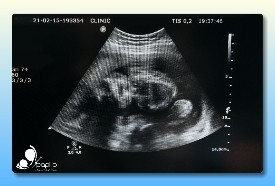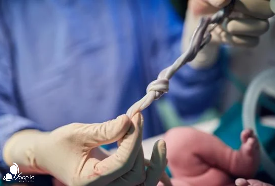CAN A FETUS HEAR?

People often wonder if a fetus can hear while in the womb. Many expectant parents will speak to or play music for a developing fetus.
Evidence suggests that the auditory system starts forming at the 18th week of pregnancy and continues to develop until the baby is between 5 and 6 months of age.
Everything that the fetus hears will contribute to this process. In this article, we look at what a fetus can hear at different stages of development.
*Fetal hearing at each stage of development*
A fetus will develop their ability to hear while in the womb.
Despite being close to a lentil in size, an embryo will begin to develop ears during the 2nd month of pregnancy. The ears start as tiny folds of skin on the sides of the head. After the 8th week, the embryo becomes a fetus.
According to Mayo Clinic, the ears begin to stick out from the head at 18 weeks, and the fetus may become able to hear. At this stage, the brain starts to designate the areas that will govern smell, taste, vision, touch, and sound.
By 22 to 24 weeks, the fetus will be about the size of a mango and will start to hear low-frequency noises from outside of the womb.
As the fetus grows and their sense of hearing develops, they will be able to distinguish an increasing number of different sounds.
Research suggests that the most vital time for the development of hearing is between 25 weeks of pregnancy and 5 to 6 months of age.
By the time babies reach the age of 6 months, they will be able to turn their eyes or head toward the source of a sound.
*Can they differentiate between different voices?*
At first, a fetus cannot distinguish between different voices.
A fetus begins responding to sound at between 22 and 24 weeks but can only hear low frequencies, such as a dog barking or a lawn mower.
As the auditory system and the brain continue to develop, this range increases. By late pregnancy, the fetus can hear voices and distinguish between them.
*Are loud noises bad for the fetus?*
Many people wonder whether it is safe to attend a loud concert or work in a noisy job while pregnant. While occasionally hearing loud sounds is unlikely to be harmful, researchTrusted Source has found that prolonged exposure to loud noises may contribute to hearing loss in the baby.
Examples of noisy jobs include those that involve people working in close proximity to:
loud music
crowds
sirens
trucks
airplanes
machinery
guns
According to the National Institute for Occupational Safety and HealthTrusted Source, researchers are unsure of what noise levels are safe for a developing fetus.
However, taking into consideration how sound travels through the body, they recommend that pregnant women avoid very loud situations — anything louder than 115 decibels, which is about as loud as a chain saw — as much as possible.
*Can the fetus hear music?*
A fetus can benefit from hearing speech and music.
The noises that a fetus hears from around week 23 of pregnancy are vital to their future hearing. But we can skip music as it is not recommended by muslim scholar to be part of parenting.
Specific parts of the auditory system need these noises to develop properly. As such, scientists recommend exposing a fetus to both speech and music. But again, muslim family must change music to Qur'an instead.
Many people believe that playing classical music to a growing fetus will help brain development and boost IQ, but there is little evidence to support this claim.
*What does it sound like in the womb?*
It is noisy in the womb. As the fetus’s auditory system develops, it will encounter all types of sound from within the woman’s body. These include the heartbeat, as well as the noises of the blood flow and digestive system.
Around the 23rd week of pregnancy, the fetus will also be able to hear noises from outside of the womb. These include speech and music. As the fetus develops, all of the sounds will become louder and more distinguishable.
Amniotic fluid surrounds the growing baby in the womb, and the woman’s body tissues encase them, so noises from outside the body will sound muffled..
*Summary*
The ears of a fetus start to develop relatively early in pregnancy. However, hearing does not develop until the auditory system, the brain, and certain pathways start to form, which usually occurs between weeks 22 and 24.
The auditory system requires stimulation through speech, music, and other sounds to grow properly. As it does, the fetus will be able to hear more and more.
A baby’s hearing continues to develop after birth, until around 5 or 6 months of age.
As for muslim family, we surely know what can be the best for the fetus to hear. Yes, it's the recital of Qur'an and dhikr. Of course, the real intention to recite Qur'an and dhikr is not for the sake of the fetus. But only for Allah. We do it as a good deed that has a reward from Allah subhanahu wa ta'ala.
As for the fetus, it is a part of an early parenting. We teach the Qur'an to our children since the beginning of their life in their mother's womb. So the first sound a baby can hear is Qur'an. It's an Islamic way of parenting. To make fetus hear the Qur'an, not classical music.
May Allah accept our intention and good deeds.
Barokallohu fiikum jami'an.
Source :
1. https://www.medicalnewstoday.com/articles/324464#summary
2. Embryonic and fetal development. (2018).
https://www.scdhec.gov/sites/default/files/Library/ML-017049.pdf
3. Fetal development: The 2nd trimester. (2017).
https://www.mayoclinic.org/healthy-lifestyle/pregnancy-week-by-week/in-depth/fetal-development/art-20046151
4. Graven, S. N., & Browne, J. V. (2008). Auditory development in the fetus and infant [Abstract].
https://www.sciencedirect.com/science/article/pii/S1527336908001347
5. Graven, S. N., & Browne, J. V. (2008). Sensory development in the fetus, neonate, and infant: introduction and overview [Abstract].
https://www.sciencedirect.com/science/article/pii/S1527336908001311
6. Hepper, P. (2005). Unravelling our beginnings.
https://thepsychologist.bps.org.uk/volume-18/edition-8/unravelling-our-beginnings
7. Reproductive health and the workplace. (2017).
https://www.cdc.gov/niosh/topics/repro/noise.html
8. Selander, J., et al. (2016). Maternal occupational exposure to noise during pregnancy and hearing dysfunction in children: A nationwide prospective cohort study in Sweden.
https://www.ncbi.nlm.nih.gov/pmc/articles/PMC4892921/




